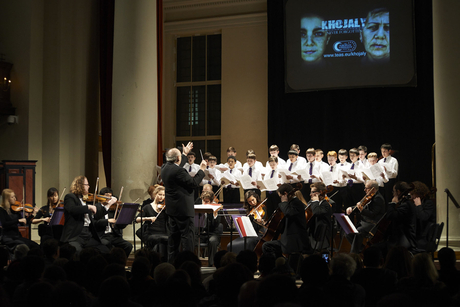Over 500 people attends in Khojaly commemoration concert in London

An audience of more than 500 people, including Lords, MPs, diplomats and music-lovers, attended the Khojaly Commemoration Concert on Tuesday at St. John`s, Smith Square, in the shadow of the Houses of Parliament.
The concert was organised by The European Azerbaijan Society (TEAS) in order to commemorate the 613 civilians killed on February 26, 1992 in the Azerbaijani town of Khojaly, Nagorno-Karabakh, when it was forcibly occupied by Armenian armed forces, supported by the No. 366 Soviet Infantry Regiment. The evening featured the London-based Orion Orchestra under the baton of the leading conductor and composer Laurent Petitgirard.
The centrepiece of the evening was the UK première of a moving new piece, Khojaly 613, composed by Pierre Thilloy, dedicated to the victims of the Khojaly tragedy, which received its world première in Paris on February 21. The work was written for violin, balaban, percussion and string orchestra. Featured was the evocative sound of the balaban, an Azerbaijani wind instrument, performed by the internationally-acclaimed virtuoso Shirzad Fataliyev. The violinist was Sabina Rakcheyeva, the first Azerbaijani graduate from the Juilliard School in New York and Cultural Advisor, TEAS.
This outstanding work ably captured the horror of the Khojaly Massacre, featuring Azerbaijani folk tunes, including Lachin and Sari Gelin, set against a rich orchestral backdrop of military march rhythms and the sounds of conflict. The violin and balaban - which has a plaintive quality, akin to the human voice - represented the soul of the Azerbaijani people that fateful night, with the violin solo section gradually reaching a furious tempo until coming to a sudden, unexpected halt.
Writing about the piece, the composer said: "The Khojaly Massacre ranks amongst one of the most vivid and nightmarish visions in the collective memory of the Azerbaijani people, stemming from the dark, insidious Nagorno-Karabakh conflict that continues to harm an entire people.
"There is a mechanism, commonly called `memory`, which, far from providing vulgar pathos, is a bulwark against oblivion, and operates as a timeless sentinel of dignity. `Memory` has always been a creative banner for composers and artists, who, beyond any political or revolutionary context, are able to remind others of milestones, troubled moments, and dramas, which touch the very depths of their soul."
Fakhraddin Gurbanov, Azerbaijani Ambassador to the UK, said: "The tragedy happened exactly 21 years ago today. At that time, the conflict between Azerbaijan and Armenia was taking place, and we still remain at war, although a ceasefire was declared in 1994. The Khojaly Massacre was one of the blackest pages in the history of our nation. It is apt that this concert is taking place in a former church. Whether it is a church, mosque or temple, these are the houses of God. Human beings are the creatures of God, who gave us life, and only God has the right to take away life. Those people who took away the lives of these 613 people have never been brought to justice. International law forbids the killing of civilians, and this was a crime. Such terrible occurrences must never be repeated."
Tale Heydarov, Chairman, TEAS commented: "The UK has been through two world wars, which were the biggest in the history of mankind, and Europe lost millions of people. Today, we see a stable Europe. Those wars have taught people a big lesson. Those people who committed crimes were brought to justice. This was not the case with the perpetrators of the Khojaly Massacre, which was a planned offensive against civilians."
Christopher Pincher MP, Chair, Azerbaijan All-Party
Parliamentary Group (APPG) continued: "All those who died were
someone`s husband, wife, daughter, or son. The Nagorno-Karabakh war
has a continuing impact. The great English philosopher Edmund Burke
said that: `Those who do not know their history are destined to
repeat it. We must never repeat the horrors of 26 February 1992. It
is the responsibility of those who seek greater friendship with
Azerbaijan to remember this, and to play their part in remembering
the victims and ensuring that it never happens again."
The program also included the Nizami Symphony by the Azerbaijani
composer Fikret Amirov (1922-84), which was inspired by the work of
the 12th century Azerbaijani poet Nizami Ganjavi. This piece
demonstrated his synthesis of western classical techniques and
glorious, passionate Azerbaijani mugham, known as `symphonic
mugham`.
It is generally acknowledged that mugham music originated in the Nagorno-Karabakh region, which remains occupied by Armenia. This ongoing occupation has caused the camps housing 875,000 internally displaced persons (IDPs) and refugees to be spread across Azerbaijan.
The evening also included the angelic sound of the Schola
Cantorum of the Cardinal Vaughan Memorial School Choir, performing
two pieces dedicated to Christ`s suffering on the Cross -
Pergolesi`s Stabat Mater and Mozart`s Ave Verum Corpus. Also on the
program was Sir Edward Elgar`s elegiac Introduction and Allegro for
Strings, a multilayered symphonic poem, featuring polyphonic
interwoven themes and a fragment of a Welsh traditional song. As an
encore, the string orchestra performed a piece of meditative music
by Laurent Petitgirard, written for a section of the film Ecrire
contre l`oubli (Lest We Forget).
This beautiful music and evocative setting had an undeniable impact
on all those in attendance, making them aware of the terrible
events of 21 years ago, and of the ongoing plight of the
Azerbaijanis who remain unable to return their homes and lands.
